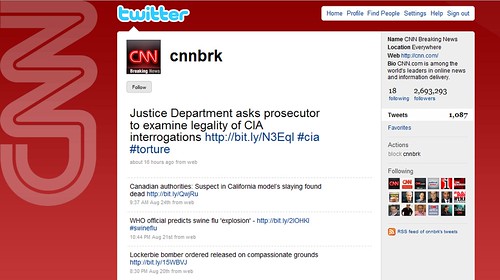 I remembered one of my friends telling me this – “What’s the big deal of Twitter? Who would really bother about the fact that you’re picking your nose in front of the computer? It’s just useless”. You can’t blame him because most teenagers out there have negative perceptions towards Twitter too. However, there’s a hidden fact that most people (especially non-Twitter users) aren’t aware of.
I remembered one of my friends telling me this – “What’s the big deal of Twitter? Who would really bother about the fact that you’re picking your nose in front of the computer? It’s just useless”. You can’t blame him because most teenagers out there have negative perceptions towards Twitter too. However, there’s a hidden fact that most people (especially non-Twitter users) aren’t aware of.
Besides being a micro-blogging platform which enables users to share their personal lives, thoughts and opinions of a particular issue in less than 140 characters, Twitter has actually emerged from a “What are you doing?” website to an epicenter of world events whereby every user on the Twitterverse becomes a journalist, breaking news in real-time which claims to be much faster and probably even more accurate than the traditional media. Even though every one turns into a web journalist, but it still requires a large community to break the news simultaneously in order for the information to reach the other part of the world.

Unlike Facebook and other social networking websites, Twitter contains a wide variety of news and rich information categorized into different topics such as breaking world news, NBA scores, or even the latest tech products/news in the technology world. As such, it could easily “destroy” the so-called Web 1.0 version of RSS (Really Simple Syndication) Feeds and transform into a new version of feeds. Feed Reader = Twitter, Websites/Blogs = Twitter Profiles and last but not least, Feeds = Tweets.
For example, if you want to keep updated to the latest breaking news happening in the physical world, you can either follow @CNNbrk or @NYTimes. If you’re a social media addict like me, you can follow tech blog giants – @TechCrunch and @Mashable. How about a roundup of the latest breaking NFL news via Twitter? No worries. Although @NHLFeed is unofficial, but it does offers pretty fast and accurate updates.
Some companies such as BBC (British Broadcasting Company) has over a dozen of official Twitter feeds. The folks at BBC categorized their news into different topics to suit the interest of users. For example, if a doctor wants to receive only news related to “Health” and not other information, he or she can follow @BBCHealth.
With regards to Twitter’s exponential growth, an increasing number of companies or websites tend to use the world’s most popular micro-blogging platform as a way to promote their articles. As a result, we need not to have feed readers to get the latest updates from websites/blogs anymore. Receiving tweets in our timeline seems to be the preferred choice over RSS feeds.